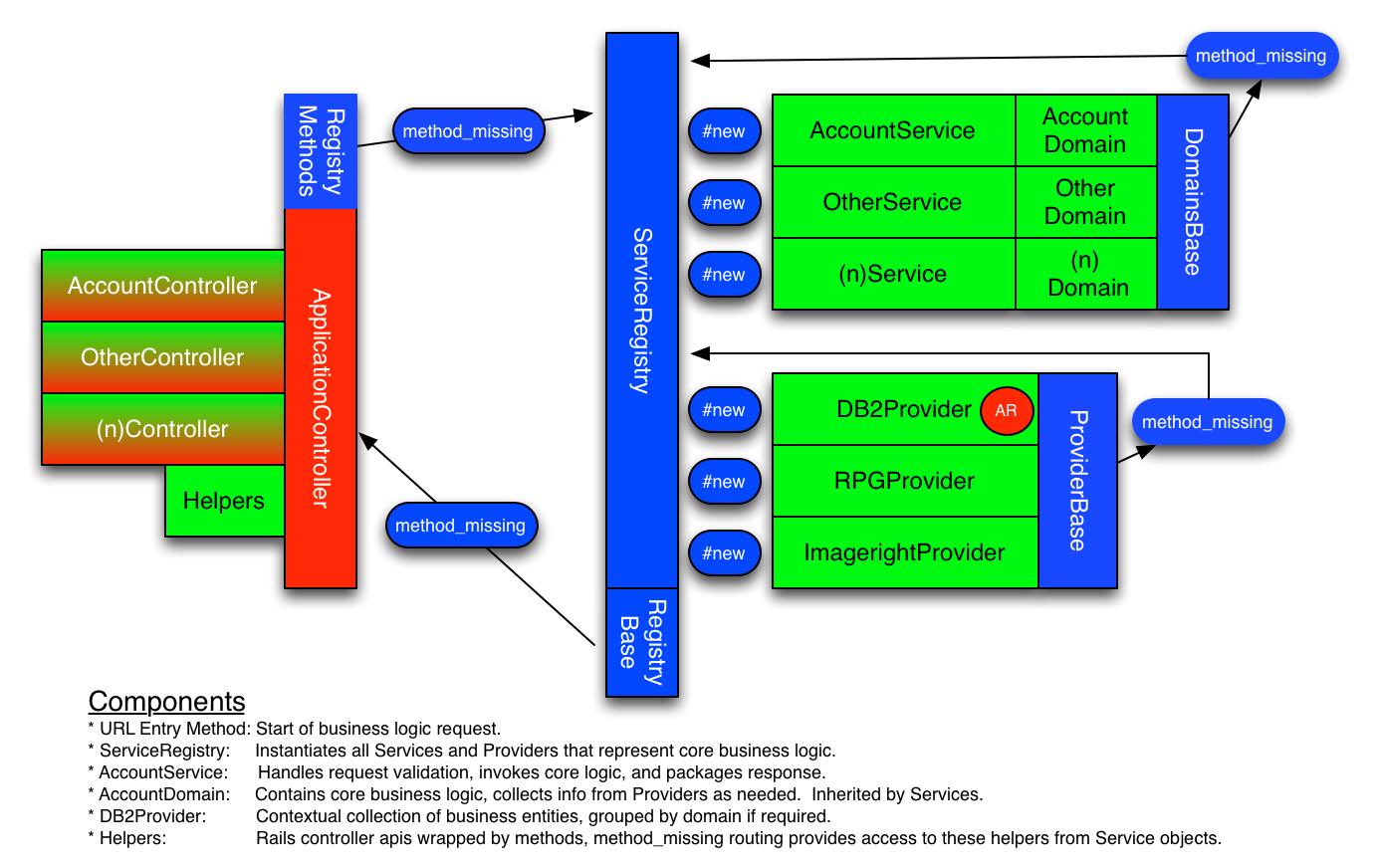Responsible for initializing or launching ServiceDomain, Providers, and Processors classes, when invoked by Rails controller or peer ServiceDomains. ServiceRegistry is a PORO initially instantiated by the ApplicationController’s #method_missing on first use.

# app/controllers/application_controller.rb
class ApplicationController < ActionController::Base
include Registry::RegistryMethods # Development Strategy
end# app/strategy/registry/registry_methods.rb
module Registry
module RegistryMethods
# New Services extension
def service_registry
@service_registry ||= Services::ServiceRegistry.new({registry: self})
end
protected
# Response wrapper for use in controller
def wrap_html_response(service_response, redirect_path=root_path)
@page_controls = service_response
flash[:notice] = @page_controls.message if @page_controls.message.present?
redirect_to redirect_path, notice: @page_controls.message and return unless @page_controls.success
end
def wrap_html_and_redirect_response(service_response, redirect_path=root_path)
@page_controls = service_response
flash[:notice] = @page_controls.message if @page_controls.message.present?
redirect_to redirect_path, notice: @page_controls.message and return
end
def wrap_json_response(service_response)
@page_controls = service_response
render(json: @page_controls.to_hash, status: (@page_controls.package.success ? :accepted : :not_found), layout: false, content_type: :json) and return
end
# Easier to code than delegation, or forwarder
def method_missing(method, *args, &block)
Rails.logger.debug("#{self.class.name}##{__method__}() looking for: #{method.inspect}")
if service_registry.public_methods.try(:include?, method)
block_given? ? service_registry.send(method, *args, block) :
(args.size == 0 ? service_registry.send(method) : service_registry.send(method, *args))
else
super
end
end
end
end# app/strategy/services/service_registry.rb
module Services
class ServiceRegistry < ::Registry::RegistryBase
##
# Application Services used in Controller methods
##
def access_service
@sf_access_service ||= AccessService.new({registry: self}) # First call will execute this set of code
end
def content_service
@sf_content_service ||= ContentService.new({registry: self})
end
##
# Content Providers
##
def xml_profile_provider
@sf_xml_profile_builder ||= Providers::XMLProfileProvider.new({registry: self})
end
def db_profile_provider
@sf_db_profile_builder ||= Providers::DBProfileProvider.new({registry: self})
end
##
# Content Adapters
##
def content_adapter_file_system
@sf_content_adapter_file_system ||= Processors::FileSystemProcessor.new({registry: self})
end
def content_adapter_inline_values
@sf_content_adapter_inline_values ||= Processors::InlineValuesProcessor.new({registry: self})
end
##
# Adapter by Content
# Will accepts ResultBean, Hash, or single string value
# - An experiment of ways to switch duck targets, not really needed
def adapter_for_content_profile_entry(content)
content_type = (content.respond_to?(:to_hash) ? (content[:content_type] || content['content_type']) : content)
case content_type
when "Commission", "Activity", "FileDownload", 'Experience', 'FileDownload'
content_adapter_file_system
when "Notification", "LicensedStates"
content_adapter_inline_values
else
content_adapter_file_system # default for now
end
end
end
end# app/strategy/registry/registry_base.rb
module Registry
class RegistryBase
attr_accessor :registry
def initialize(params={})
params.keys.each do |k|
instance_variable_set "@#{k.to_s}".to_sym, nil
instance_variable_set "@#{k.to_s}".to_sym, params[k]
end
raise ArgumentError, "#{self.class.name}: Missing required initialization param!" if @registry.nil?
end
# User Session Handler
def get_session_param(key)
@registry.session[key]
end
def set_session_param(key, value)
@registry.session[key] = value
end
# Not required, simply reduces traffic since it is called often
def current_user
@current_user ||= registry.current_user
end
protected
# Support the regular respond_to? method by
# answering for any method the controller actually handles
#:nodoc:
def respond_to_missing?(method, incl_private=false)
registry.send(:respond_to?, method, incl_private) || super
end
private
# Easier to code than delegation, or forwarder; @registry assumed to equal @controller
def method_missing(method, *args, &block)
Rails.logger.debug("#{self.class.name}##{__method__}() looking for: #{method}")
if registry.public_methods.try(:include?, method)
block_given? ? registry.send(method, *args, block) :
(args.size == 0 ? registry.send(method) : registry.send(method, *args))
else
super
end
end
end
end# app/strategy/domains/domains_base.rb
module Domains
class DomainsBase
attr_accessor :registry
def initialize(params={})
params.keys.each do |k|
instance_variable_set "@#{k.to_s}".to_sym, nil
instance_variable_set "@#{k.to_s}".to_sym, params[k]
end
raise ArgumentError, "#{self.class.name}: Missing required initialization param!" if @registry.nil?
end
...
private
# Easier to code than delegation, or forwarder
# Allows strategy.domains, service, to access objects in service_registry and/or controller methods by name only: like curent_user
def method_missing(method, *args, &block)
Rails.logger.debug("#{self.class.name}##{__method__}() looking for: #{method}")
block_given? ? registry.send(method, *args, block) :
(args.size == 0 ? registry.send(method) : registry.send(method, *args))
end
end
end# app/strategy/providers/providers_base.rb
module Providers
class ProvidersBase
attr_accessor :registry
def initialize(params={})
params.keys.each do |k|
instance_variable_set "@#{k.to_s}".to_sym, nil
instance_variable_set "@#{k.to_s}".to_sym, params[k]
end
raise ArgumentError, "#{self.class.name}: Missing required initialization param!" if @registry.nil?
end
...
private
# Easier to code than delegation, or forwarder; @registry assumed to equal @controller
def method_missing(method, *args, &block)
Rails.logger.debug("#{self.class.name}##{__method__}() looking for: #{method}")
block_given? ? registry.send(method, *args, block) :
(args.size == 0 ? registry.send(method) : registry.send(method, *args))
end
end
end# app/strategy/processors/processors_base.rb
module Processors
class ProcessorBase
attr_accessor :registry
def initialize(params={})
params.keys.each do |k|
instance_variable_set "@#{k.to_s}".to_sym, nil
instance_variable_set "@#{k.to_s}".to_sym, params[k]
end
raise ArgumentError, "#{self.class.name}: Missing required initialization param!" if @registry.nil?
end
def ready?
raise NotImplementedError, "#{self.name}##{__method__} Not Implemented!"
end
...
protected
# Easier to code than delegation, or forwarder
# Allows strategy.domains, service, to access objects in service_registry and/or controller by name only
def method_missing(method, *args, &block)
Rails.logger.debug("#{self.class.name}##{__method__}() looking for: #{method}")
block_given? ? registry.send(method, *args, block) :
(args.size == 0 ? registry.send(method) : registry.send(method, *args))
end
end
endback to SknStrategy Introduction